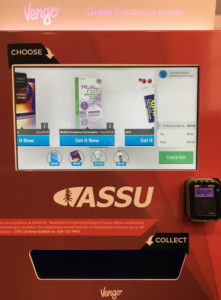Just in time for the new school year, a vending machine dispensing emergency contraceptives has been installed in restroom 114 on the first floor of Old Union.

The machine, which accepts credit cards, sells both external and internal condoms as well as My Way at subsidized rates. My Way, similar to Plan B, is a morning-after pill that can reduce the chance of pregnancy by up to 87 percent if taken within 72 hours of unprotected sex.
Costs for the machine were split between ASSU and Stanford’s division of Institutional Equity & Access, which oversees the Office of Sexual Assault and Relationship Abuse Education and Response (SARA) and four other offices. A second vending machine, selling food to be taken with contraceptives, was also installed outside the all-gender restrooms.
The idea to install such a machine on campus came from Rachel Samuels ’17. Samuels said she got the idea from her older brother, who had successfully lobbied for a similar machine at Pomona College. She wondered why such a machine did not exist at Stanford.
“He was like, ‘This is so important. You need to do this at Stanford,’” Samuels said.
That was in January 2015 — over two and a half years ago. According to Samuels, the process from the machine’s inception to its installation was a long and complicated one, involving multiple meetings with administrators to seek their support and resolve potential legal and logistical issues.
Shortly after the conversation with her brother, Samuels reached out to a handful of student activists who knew more about reproductive health than she did. Together, they sent out a survey gauging student interest in the issue, garnering 325 responses within one week — the majority of which were in favor of making emergency contraceptives more accessible.
Prior to the machine’s installation, the pharmacy at the Vaden Health Center was the only on-campus location where students could purchase emergency contraceptives. The pharmacy is only open on weekdays and for standard working hours during the academic year, with reduced hours over the summer. Outside of those limited hours, students would have had to purchase emergency contraceptives off-campus, and at full price.
“It’s a right, and our rights should not be limited to business hours,” Samuels said.
Progress on the machine ground to a halt when Samuels went abroad for much of her junior year, returning in the spring of 2016. Upon her return to campus, Samuels — who served as chief of staff on the 2016-2017 ASSU Executive Cabinet — redoubled her efforts, making the issue part of the ASSU Executive’s platform and pitching the machine in discussions with then-Vice Provost for Student Affairs Greg Boardman.
In the fall of 2016, Samuels caught the attention of Lauren Schoenthaler, senior associate vice provost for Institutional Equity & Access, and Carley Flanery, director of SARA, both of whom expressed their support for the machine.
In an email to The Daily, Schoenthaler wrote that she and Flanery were “immediately intrigued by the idea.”
“We always want to be responsive to the needs of students,” Schoenthaler wrote. “At long last, I am happy to see the student leaders’ efforts realized, and I hope that the machine serves the needs of our student community.”
Flanery added in a statement that “reproductive justice is connected to the work we do [at SARA] in empowering agency over one’s body in sexual and intimate relationships.”
However, Schoenthaler said that the “seemingly simple concept” raised many questions that needed to be addressed before the machine could be installed. The issues ranged from logistical concerns — such as the machine’s location on campus, what kind of machine to install and who would stock it — to legal uncertainties.
Samuels had originally proposed that the machine stock Plan B, which was switched out in favor of My Way, a generic form. Samuels and Schoenthaler also noted some apprehension on the part of administrators about possible age restrictions on purchasing contraceptives, but contraceptives can be purchased over-the-counter or online without identification.
Even after her graduation, Samuels maintained weekly contact with the administration and the new ASSU Executives, Justice Tention ’18 and Vicki Niu ’18, to ensure that the machine would be installed. Samuels said that she was “excited and in disbelief” when the machine finally began operation in early September.
“In the end, Stanford administrators did step up and do it, and I’m very grateful for that,” Samuels said. “It’s nice to just keep in mind that they really should be caring about students, and this was a time when they did.”
Products available in the newly-installed machine:
- External condoms, 3-pack: $3.99
- Internal condoms, 3-pack: $9.99
- My Way: $25.00
- Advil, tube of ten: $4.49
Contact Jacob Nierenberg at jhn2017 ‘at’ stanford.edu.
